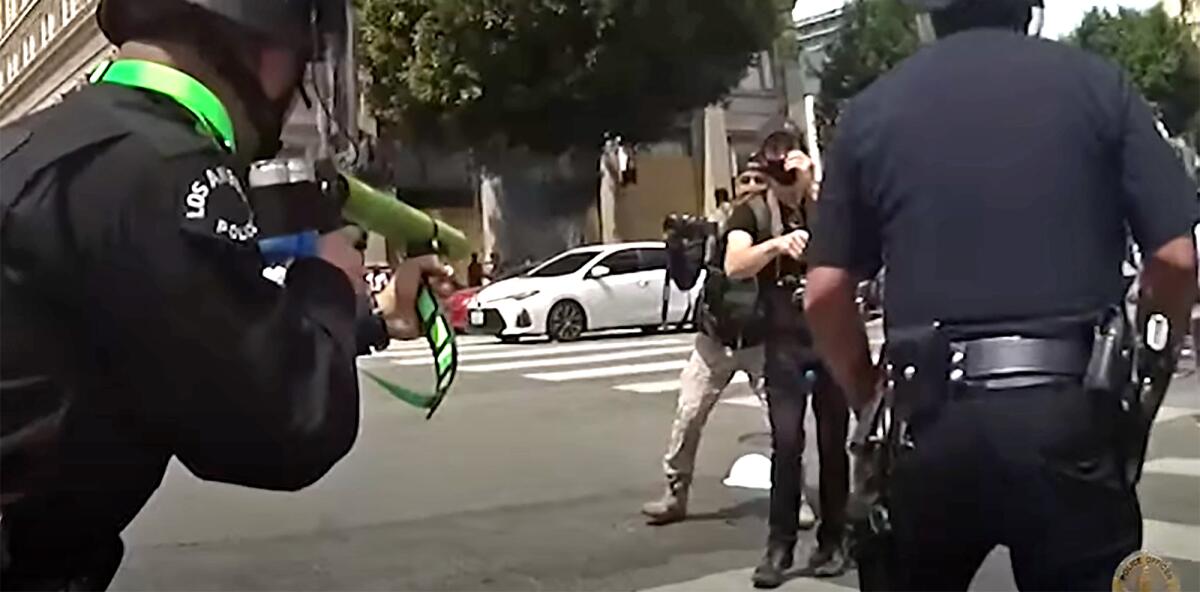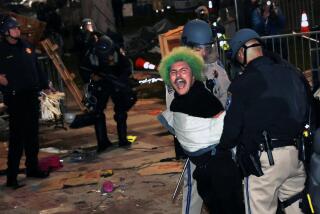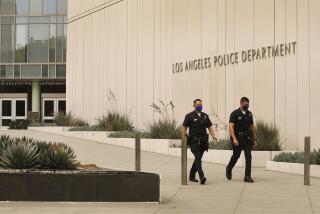Protester gets $1.5-million settlement over testicle injury caused by LAPD projectile

A Los Angeles protester whose testicle was injured when an LAPD officer shot him with a hard-foam projectile during a street demonstration in 2020 has received a $1.5 million settlement from the city, his attorneys announced Thursday.
The payout is the largest yet to arise from lawsuits accusing the LAPD of excessive force during repeated crackdowns on protesters in the wake of George Floydâs murder by Minneapolis police, which spurred massive demonstrations across the nation during the early days of the COVID-19 pandemic.
It is also a stark reminder of the stakes that exist for taxpayers when police agencies use so-called less-lethal weapons for crowd control â as they have repeatedly done in recent weeks to clear pro-Palestinian encampments at college campuses in California and across the nation.
The settlement resolves a civil rights lawsuit protester Benjamin Montemayor filed against the city of L.A. and the LAPD, alleging excessive force and other violations of his constitutional rights.
The city did not admit any liability as part of the settlement, according to a copy reviewed by The Times. Former LAPD Chief Michel Moore and a department Use of Force Review Board had both found that the officer who shot Montemayor had acted within policy, but the Los Angeles Police Commission ruled otherwise â finding the shooting was unjustified.
Montemayor and a friend had been standing in a Hollywood crosswalk holding a large sign calling for the LAPD to be defunded in June 2020 when officers rushed forward, video of the incident showed. A dispersal order had been given, but Montemayor said he hadnât heard it.
The video showed an officer grab Montemayorâs friend, causing her to drop her end of the sign and move out of view. Simultaneously, another officer rushed at Montemayor as he backed away.
The officer ripped the sign from Montemayorâs hand as Montemayor then put his hands up in the air, the video showed. Another officer then shoved Montemayor backward. As Montemayor began to slowly move forward again â he said to help his friend, who had been thrown to the ground â another officer stepped forward and shot him with a 40-millimeter projectile from several feet away, the video showed.
Such weapons can cause devastating injuries, especially at close range. The round fired at Montemayor caused his testicles to immediately swell, the right one to the size of a grapefruit, his lawsuit alleged. He was rushed into emergency surgery â which involved âpiecing back together portions of his testicle which had exploded,â his lawsuit said.
Montemayorâs experience was highlighted in an extensive Times story just days later, about many protesters being injured by LAPD officers using projectiles and batons. The story spurred the LAPD to launch an investigation into Montemayorâs shooting and others.
Montemayor, now 32 and a filmmaker, said he has mostly recovered, but he still experiences back pain that began after his surgery and a âheightened nervous system responseâ every time he sees police. He said reading about the weapons being hauled out by police at recent campus protests was âfrightening.â
âIâm scared that theyâre still being wielded by people who arenât adequately trained to handle them and that theyâre misusing their power,â he said. âItâs sad that itâs behavior we have to continue to call attention to.â
Montemayor said he planned to use the settlement money to âbuild a normal life,â perhaps putting it toward buying a house or saving for retirement. He said he also wants to use it âto bring more awareness to such a broken system.â
Neither the LAPD nor City Atty. Hydee Feldstein Soto responded Thursday to a request for comment on Montemayorâs settlement.
David Clay Washington, one of Montemayorâs attorneys, said the LAPDâs response to the 2020 demonstrations was âchaotic and excessive,â and âdespite independent investigations and dozens of lawsuits, it remains that way today. We saw it most recently in the LAPDâs response to demonstrations at UCLA.â
Another attorney, Dan Stormer, said the LAPD âneeds to end its cowardly attacks on innocent citizensâ with such weapons, which he said would continue unless Mayor Karen Bass put an end to âthis horrific and lawless behavior.â
The parameters under which LAPD officers are allowed to use the weapons, and the information they must track and report when they are used, have changed since 2020 because of a court injunction and the passage of a state law.
Under the changes, 40-millimeter rounds are supposed to be used only by trained officers when âabsolutely necessaryâ against people acting violently or presenting an immediate threat to the officers or others. They are not to be aimed indiscriminately into crowds, and officers are forbidden from targeting the head, neck, face, eyes, kidneys, chest, groin or spine.
The LAPD has said its use of projectile weapons at campus protests has been extremely limited.
The Montemayor settlement follows others.
Deon Jones, a protester who was shot in the face by an LAPD projectile and was also featured in the Timesâ earliest coverage of police injuries to protesters in 2020, won an $860,000 settlement from the city last year. Iz Sinistra, a protester who was shot in the head with an LAPD projectile and was also featured in the Times, won a $1.25-million settlement in 2022.
The largest case against the city over the LAPDâs actions in 2020 â a class-action lawsuit representing hundreds of protesters who allege they were injured, improperly detained and otherwise mistreated â is still pending.
Medical and legal experts have repeatedly called on police agencies in California to stop using projectile weapons at fast-moving protests and other crowd control settings. Police say the weapons are one of the only tools that officers have to keep themselves safe in volatile settings.
The weapons have been used by police at multiple college campuses in recent weeks, including USC, UCLA and UC Irvine.
More to Read
Sign up for Essential California
The most important California stories and recommendations in your inbox every morning.
You may occasionally receive promotional content from the Los Angeles Times.











